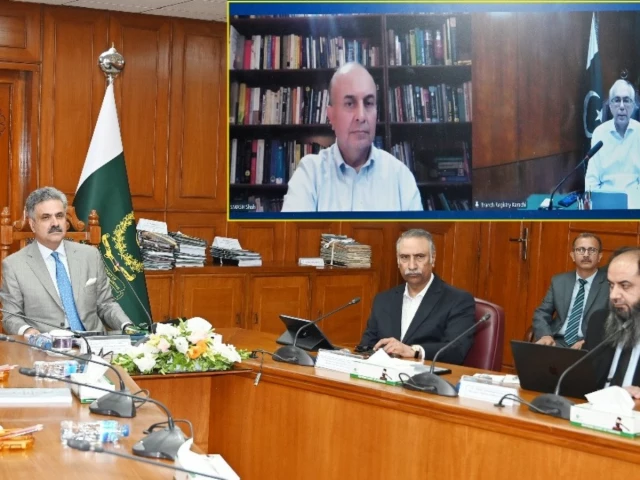SJC bars judges from media interaction, political debate under new code of conduct
Revised code directs judges to keep their conduct beyond reproach, avoid any behaviour raising questions of propriety

The Supreme Judicial Council has approved amendments to the Code of Conduct for Supreme Court and High Court judges. The amendment prohibits judges from speaking to the media on judicial or political matters and from attending or presiding over public events while in office.
The meeting of the Supreme Judicial Council (SJC) was chaired by Chief Justice of Pakistan, Justice Yahya Afridi, at the Supreme Court of Pakistan. Justice Syed Mansoor Ali Shah and Justice Munib Akhtar attended the proceedings virtually, while Miss Aalia Neelum, Chief Justice of the Lahore High Court, and Justice Sardar Muhammad Sarfraz Dogar, Chief Justice of the Islamabad High Court, were present in person.
The revised code lays down that judges must keep their behaviour beyond reproach and refrain from conduct that may raise questions of propriety. “To be above reproach, and for this purpose to keep his conduct in all things, official and private, free from impropriety is expected of a Judge,” states Article III of the amended code.
The amendments reinforce existing expectations of recusal where conflicts of interest exist. Judges are directed not to hear cases involving their own interests or those of close associates. “A Judge must decline resolutely to act in a case involving his own interest, including those of persons whom he regards and treats as near relatives or close [friends],” reads Article IV. It further directs that, “A Judge must rigidly refrain from entering into or continuing any business dealing, howsoever unimportant it may be, with any party to a case before him.”
In a significant addition, it also prohibits judges from participating in public debate or political discussion, especially through media. “A Judge should not engage in any public controversy, whether by way of speech, writing, debate or comment at any forum, and least of all on political questions, even if such questions involve a question of law.”
The article further notes: “He shall not have any interaction with the media, especially in relation to issues which may give rise to public debate or adversely affect institutional collegiality and discipline.”
If public allegations are made against a judge, the code prescribes a formal reporting mechanism. “He may place the matter in writing before Committee comprising the Chief Justice of Pakistan and four Senior Judges of Supreme Court of Pakistan through its registrar for an appropriate institutional response.”
Judges are further instructed to avoid any public commentary on judicial or administrative matters. “He shall not cause any judicial or administrative matter to be discussed publicly, nor shall he make public any communication relating to his personal or official matters.”
On financial conduct, the code warns against involvement in trade, industry, or speculative investments. “A Judge should endeavour to avoid, as far as possible, being involved in litigation either on his own behalf or on behalf of others. In particular he should not involve himself in activities such as industry, trade, or speculative transactions, for the pursuit of wealth can never be the objective of a Judge.”
It also cautions: “To employ the influence of his position to gain undue advantage, whether immediate or future, is a grave fault.”
The amendments restrict judges from taking part in organisational roles or political activity. Article VII notes: “Extra-judicial duties or responsibilities, official or private, should be generally avoided. He should equally avoid being a candidate for any elective office in any organisation whatsoever.”
On the issue of gifts and hospitality, the code provides: “Gifts are to be received only from near relatives and close friends, and only such as are customary. Everything in the way of favours in consequence of the office must be refused.”
Furthermore, it also added, “A superior court judge would not accept an invitation of dinner/reception to be hosted in his honour from an individual member of the Bar.”
The amended code also emphasises timely justice. “A Judge shall take all steps to decide cases within the shortest time, controlling effectively efforts made to prevent early disposal of cases and make every endeavour to minimise suffering of litigants by deciding cases expeditiously through proper written judgments.”
To protect judicial independence, Article XV outlines steps to report undue influence. “The judge shall immediately inform, in writing, the chief justice of the relevant High Court, the Chief Justice of Pakistan and four senior most Judges of the Supreme Court through respective registrars.”
In such cases, the matter must be placed before a committee and resolved within a specified period. “The decision by the committee on the report shall be made within a fortnight.”
If the committee fails to respond in time, the code mandates escalation. “If the chief justice or the committee in the case of High Court, as the case may be, fails to respond within the stipulated timeframe, the chief justice of Pakistan alongwith four senior judges of the Supreme Court will take up the matter.”
As part of the meeting, the council also reviewed 74 complaints filed against judges. In the first phase, 67 complaints were examined, out of which 65 were dismissed, one was deferred, and one was approved for further proceedings by majority vote.
Later, due to the recusal of the chief justice of the Islamabad High Court from matters on the agenda, the council was reconstituted with the inclusion of Justice SM Attique Shah, Chief Justice of the Peshawar High Court. In this phase, seven additional complaints were reviewed—five were dismissed unanimously, while two were allowed to proceed further.
With the disposal of these 74 complaints, the total number of cases attended to by the council since October 2024 has reached 155, while 87 complaints remain pending for initial consideration.



















COMMENTS
Comments are moderated and generally will be posted if they are on-topic and not abusive.
For more information, please see our Comments FAQ